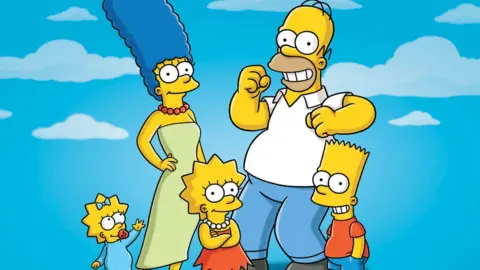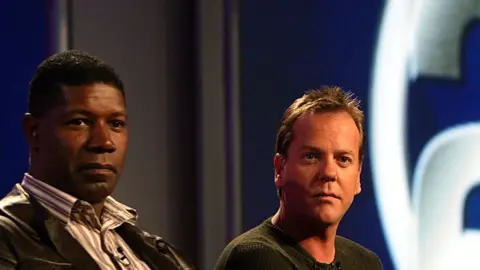The strange times TV shows have 'predicted' the future
 Netflix/Alamy/Getty
Netflix/Alamy/GettyA man escaped from prison in Peru by drugging his twin brother and leaving him in his place - in a story that's straight out of US TV show Arrested Development.
Alexander Delgado was arrested on Monday after 13 months on the run.
Jeffrey Tambor's character George Bluth does the same to his identical twin in a 2005 episode of the US sitcom.
It's not the first time a TV show - or even just Arrested Development - have been imitated by real life.
I'll build a wall
 Sam Urdank/Netflix
Sam Urdank/NetflixPeruvian police eventually foiled Alexander Delgado's plan by taking fingerprints of his twin Giancarlo.
In Arrested Development, the unlucky character of Oscar Bluth also gets drugged and has his head shaved by his bald twin George, who is in prison.
But his fingers were burnt earlier in the episode which means he can't be identified as an innocent man.
Oscar's hair doesn't grow back because of stress and he stays in prison until the next season.
When nobody believes that he's actually an innocent twin he even sets up a website called imoscar.com.
 BRENDAN SMIALOWSKI
BRENDAN SMIALOWSKIIt's not the only time life has imitated the art of Arrested Development, though.
The cult US sitcom made a comeback in 2013 after a seven-year absence, with George, a narcissistic property tycoon, out of prison.
He decides to build a wall on the USA-Mexico border. Sound familiar?
Yep, two years before Donald Trump even announced he was running for president, Arrested Development had predicted the wall.
Did 'Piggate' actually happen?
Allow X content?
Charlie Brooker's Black Mirror has form when it comes to its storylines coming true, right from the first episode.
The National Anthem is a story where the UK's prime minister is forced to have sex with a pig on TV to free a kidnapped princess.
Four years after that episode aired, a book was released alleging that the then-Prime Minister David Cameron had taken part in a club initiation ceremony involving a dead pig, when he was at university.
The story was denied by sources close to Mr Cameron, and the book's co-author Lord Ashcroft did admit he had "personal beef" with the ex-PM.
 David Dettmann/Netflix
David Dettmann/NetflixMore recently, series three's episode Nosedive seems to have come true in China.
The episode is based on people rating each other's social interactions - sort of like giving an Uber or TripAdvisor rating to every conversation you ever have.
Bryce Dallas Howard's character goes crazy in the pursuit of likes, which translate into social status.
Last year, Wired reported that China was developing a system of 'social credit'.
It tracks all your online activity, payment data and social media and could affect things like how easy it is to get a bank loan.
"The goal is to nudge people toward behaviours ranging from energy conservation to obedience to the [ruling] Party," according to the report.
Springfield is a crystal ball
 Alamy
AlamyGiven it's currently aired 629 episodes, it's probably not a surprise that some of The Simpsons' storylines have made their way into real life.
But that doesn't stop some of them seeming eerily clairvoyant.
Famously, a 2000 episode set in the future depicted Lisa as president - having taken over from President Donald Trump.
Mr Trump was a property mogul at the time who was well-known in the media, but he wasn't associated with politics.
It doesn't stop there.
More recently, fans discovered that the Disney takeover of 21st Century Fox had been predicted 19 years earlier.
Allow X content?
And one scene in the canteen of Springfield Elementary shows a barrel of the school dinners they serve the pupils which says: "Assorted horse parts".
Allow X content?

In 2013, horse meat was found in ready meals and burgers in the UK.
The Palmer effect
 Getty Images
Getty ImagesWhen the original series of US TV show 24 aired in 2001, Jack Bauer had to save presidential candidate David Palmer, a black man.
By the following season, he had won the election to become president (and was saved by Jack again).
When Barack Obama won the 2008 election, analysts put part of his success down to the Palmer effect - that a depiction of a competent black man in charge of the country "helped create a climate of public acceptance for the notion of a black president."
Dennis Haysbert, who played president Palmer, said that he had a hand in proving "the possibility there could be an African-American president" - and said he even got mistaken for Obama in a restaurant.
